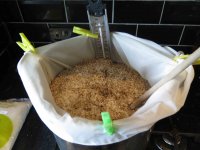Hmm. As an excruciatingly rough calculation, every 100g of sugar will add 0.009 to the gravity of 5L.
So your 800g will have boosted it by 0.072.
Some googling tells me that apple juice comes in at around 1.050, so the total starting gravity will have been in the order of 1.122.
Which means, if your cider is at 1.055 now, that your ABV will be around 8.8%, but quite sweet

That doesn't seem high enough for the alcohol content alone to have stopped fermentation, though - if you're using wine yeast, you should have got to way above that before the alcohol concentration killed the yeast. But there is a confounding factor, in that the proportion of alcohol also affects the hydrometer reading: the apparent gravity will
drop as the alcohol concentration increases. But my maths (and brewing theory) isn't quite good enough to figure that out in detail!
So, in summary - it may be that the sugar concentration was just too high, but it could well be something else. Thinking about it, when I've brewed high gravity stuff, I've usually added sugars throughout the process - it is possible that the really quite high sugar concentration (I calculate that if it all fermented out, you'd be at about 14%!) upset or stressed the yeast at the start.

























